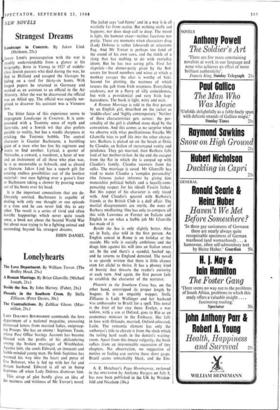Strangest Dreams
Landscape in Concrete. By Jakov Lind. (Methuen, 25s.)
JAKOV LIND% preoccupation with the war is readily understandable from a glance at his biography. Born in Vienna in 1927 of middle- class Jewish parents who died during the war, he fled to Holland and escaped the Gestapo by hiding on a roof for thirty-six hours. With forged papers he returned to Germany and worked as an assistant to an official in the Air Ministry. After the war he discovered the official was an Allied spy. The official was equally sur- prised to discover his assistant was a Viennese Jew.
The bitter farce of this experience seems to impregnate Landscape in Concrete. It is com- pounded with a Teutonic sense of myth and fairy-tale, and a Jewish wit that also prefers parable to reality, but has a needle sharpness at pricking the Teutonic bubble. The central character is Gautier Bachmann, a bumbling giant of a man who has lost his regiment and wants to find another. Lyrical, a quoter of Nietzsche, a coward, a murderer, a hater of war and an instrument of all those who plan war, he is as memorable as Schweik, and as absurd as Quixote. Jakov Lind has a superb gift for creating endless possibilities out of the lowliest material: two men fighting over a goose's liver or Bachmann taking a shower by pouring water out of his boots over his head.
It is the important connections that are de- liberately omitted. Bachmann is capable of dealing with only one thought or one episode at a time and he can never link this to any other. The result is a series of vivid and often horrific happenings which never quite touch sense, a book not about the Second World War but about man trying to be a fighting animal and succeeding beyond his strangest dreams.
JOHN DANIEL


































 Previous page
Previous page